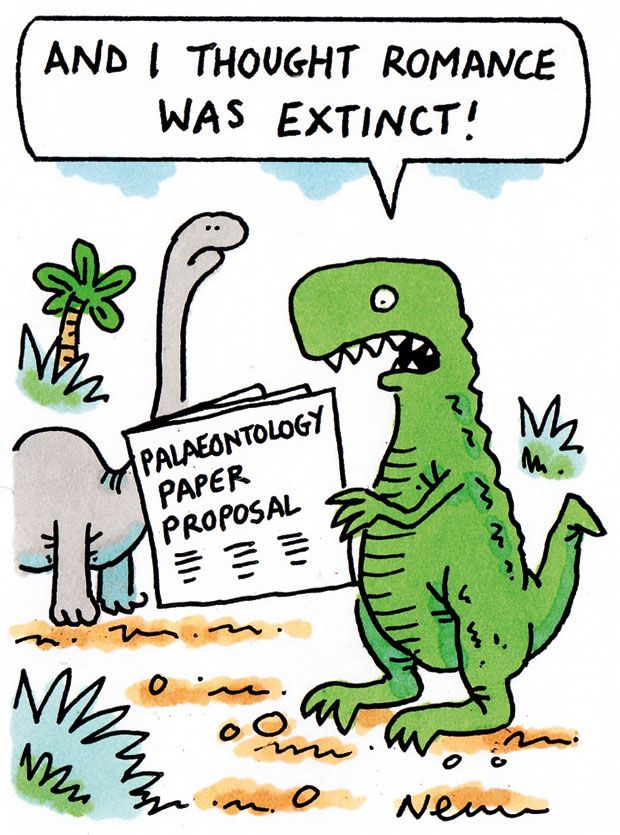
Palaeontologist Caleb M. Brown’s paper on a newly discovered dinosaur also included another important message: a proposal of marriage, The Independent reported on 5 June. Unveiling a Triceratops-like animal known as Regaliceratops peterhewsi in the journal Current Biology, the Canadian academic used a line in the acknowledgements section at the article’s end to “highlight the ongoing and unwavering support of Lorna O’Brien”, his girlfriend. “Lorna, will you marry me?” he added. Happily, Dr O’Brien – who, like Dr Brown, works at the Royal Tyrrell Museum of Palaeontology in Drumheller, Alberta – said “yes”. “We wish the very best for the couple,” said Joseph Caputo, spokesman for the journal’s publisher, who confirmed that it was the first time it had ever had a marriage proposal in its pages.
Who could possibly object to someone giving $400 million (£261 million) to a university? Well, it seems New Yorker writer Malcolm Gladwell is pretty angry about hedge fund billionaire John Paulson’s record gift to Harvard University, the US website Vox reported on 3 June. The author of The Tipping Point took to his rarely used Twitter account to ridicule Mr Paulson, whom he accused of “giving the world’s richest university $400 mil it doesn’t need” instead of helping the world’s poor. “Wise choice John!”, he added. “Next up for John Paulson: volunteering at the Hermes store on Madison avenue. Let’s make this a truly world class retail outlet!”, he joked. “If billionaires don’t step up, Harvard will soon be down to its last $30 billion,” he added, suggesting that Mr Paulson, who made billions from the 2007 subprime mortgage crash, had found “a way to give back without actually giving anything back”.
Chimpanzees prefer eating cooked food and are willing to wait for meals to be heated, researchers at Yale University have found. In a series of experiments at an African animal sanctuary, it was shown that man’s closest relatives understand the concept of cooking and have all the mental skills to do so – except the ability to control fire, the Daily Mail reported on 3 June. Presented with a pretend “oven” – a plastic tub in which animals could place raw treats, which researchers secretly swapped for cooked ones – about half the chimps opted to wait longer for their “cooked” food, the paper says. The results suggest that many of the mental skills needed to cook emerged early in human evolution before man split from chimps, the researchers say.
Lisa Jardine’s appearance on Desert Island Discs on 7 June seems to have polarised opinion among Radio 4 listeners. The historian, who is professor of Renaissance studies at University College London, was certainly not shy in telling host Kirsty Young of her many talents, which include not just being “very, very cerebral, but with a deep emotional core”, but mastering seven foreign languages, playing virtuoso classical guitar and being a “prolific” and accomplished knitter of cable-knit jumpers. “Can’t take any more of the self-congratulatory @ProfLisaJardine – she has every super power going…except humility,” said one academic on Twitter; another user said Professor Jardine was “so pleased with herself, she may well explode before the end”. But others commended Professor Jardine for “oozing confidence” and dismissed those bemoaning her “ego” as “haters of confident women”. Professor Jardine’s book selection showed she was in no mood to hide her intellectualism: she chose the full 12 volumes of P. S. Allen’s Latin Letters of Erasmus of Rotterdam – in the original Latin – to keep her occupied.
A 13-year-old schoolboy from Essex who enrolled on an astrophysics course at the Massachusetts Institute of Technology has earned one of its highest scores, The Sunday Times reported on 7 June. Connall Cairns, from Colchester, gained 81 per cent in the maths-based massive open online course, which covers rocket science, orbital mechanics and microgravity, the paper says. But Cairns, who has now enrolled on a stellar physics course at the Australian National University, is set to quit astronomy for his favourite subject – nuclear physics, he says. “I’ve been fascinated by atoms and how they work since I was seven.”
Register to continue
Why register?
- Registration is free and only takes a moment
- Once registered, you can read 3 articles a month
- Sign up for our newsletter
Subscribe
Or subscribe for unlimited access to:
- Unlimited access to news, views, insights & reviews
- Digital editions
- Digital access to THE’s university and college rankings analysis
Already registered or a current subscriber?